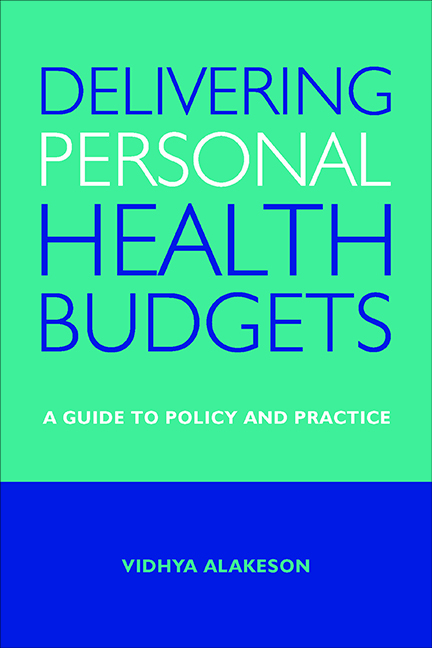Book contents
- Frontmatter
- Contents
- List of tables and figures
- Acknowledgements
- Prologue: Stephen’s story
- Introduction
- Section 1 Introducing personal health budgets
- Section 2 Implementing personal health budgets
- Section 3 Personal health budgets and organisational change in the NHS
- Conclusion
- Epilogue: Jonathan’s story
- References
- Index
Prologue: Stephen’s story
Published online by Cambridge University Press: 03 February 2022
- Frontmatter
- Contents
- List of tables and figures
- Acknowledgements
- Prologue: Stephen’s story
- Introduction
- Section 1 Introducing personal health budgets
- Section 2 Implementing personal health budgets
- Section 3 Personal health budgets and organisational change in the NHS
- Conclusion
- Epilogue: Jonathan’s story
- References
- Index
Summary
Stephen's story
In 2008, Stephen had an accident and sustained a spinal injury which left him tetraplegic and completely paralysed from the shoulders down. After three months in intensive care and a further eight months at a rehabilitation unit in Sheffield, Stephen returned home in August 2009. The period following Stephen's return home was his darkest. In rehab, the entire focus was on what Stephen could do and his partner, Nicola, was trained in the specialist care he needed. Stephen and Nicola were supported to learn what was necessary to be able to live a full and active life in the future. Everything changed when they returned home.
They chose a larger care agency because they were assured it would be better able to cope with Stephen's needs, but according to Nicola, it was ‘hell on earth’. There were early warning signs that things would not work out. Instead of covering all his needs, Stephen's care plan only focused on the physical side and did not say anything about Stephen as a father, partner or other parts of his life. Before Stephen's accident he renovated houses and was a part-time househusband, but there was no mention of the support he might need to continue his interests or simple fatherly tasks such as school runs, mealtimes, bath times and bedtimes. Agency staff were instructed not to do menial tasks considered social care such as emptying bins or changing a light bulb, even though their role was to support Stephen to be an active family member.
Stephen was getting more and more depressed, and Nicola was getting more stressed because she was also working full time. Stephen felt that they were not getting value for money. The agency's recruitment process was not personalised; there was nothing about Stephen in the process with which staff could connect. The agency would often send carers who couldn't drive, which meant that Stephen couldn't get out and about. In his first autumn and winter at home, Stephen did not leave the lounge for up to three weeks at a time. He rarely asked for care or support because he didn't relate to the care team and didn't want them in his house. While the agency ticked every box as far as the Care Quality Commission was concerned, no one ever asked Stephen's opinion about his care.
- Type
- Chapter
- Information
- Delivering Personal Health BudgetsA Guide to Policy and Practice, pp. 1 - 4Publisher: Bristol University PressPrint publication year: 2014



